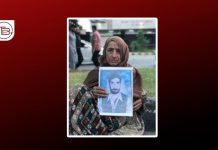Absentee funeral prayers were held for activist Karima Baloch in several cities of Balochistan and in Lahore. Scores of people gathered to pay homage to the deceased activist.
In Panjgur district of Balochistan, hundreds of civilians gathered to offer an absentee funeral prayer for Karima Baloch. The participants criticised the behaviour of the Pakistani state for “disrespecting” the dead body of the activist, saying that neither Islam nor the Baloch traditions allow for such an “indecency.”
Absentee prayers were also offered in Kharan and Naseerabad where droves of people gathered to pay their respects and pray for the prosperous afterlife of Karima Baloch. The participants lambasted the government, saying that dead bodies are not disrespected in such a manner in independent states.
They said that the people of Balochistan are fed up with this government behavior.
According to the details, an absentee funeral prayer was also offered in Lahore where admirers gathered to pay homage to Karima Baloch. Students from Balochistan, Khyber Pakhtunkhwa and Sindh were present in large numbers at the funeral. The participants said that the world saw on Sunday how the Baloch are treated by the state. A significant number of Pakistani security forces stood sentinel on the coffin of a deceased activist; this proves that Balochistan is an “occupied” territory.
A shutter-down protest was also observed in Turbat against the “disrespect” of the dead body of Karima Baloch.
The Baloch Solidarity Committee had also announced absentee funeral prayers in Quetta and Gwadar and several other areas of Balochistan.
Karima Baloch was a prominent human rights activist who was living in exile in Canada. She moved to Canada in 2015 after repeated life threats to her and her family. She is considered by many as the “pioneer of women activism in Balochistan.” She was also the first woman to lead the Baloch Students Organization Azad at a tumultuous juncture of its existence. In 2016, BBC named her as one of the most influential women in the world.
In December last year, Karima Baloch went missing in Canadian capital Toronto under mysterious circumstance. A day later, her dead body was found floating in a river. Her unexpected death engendered a massive uproar in Balochistan and abroad – activist and the general public organized mass protests and demonstrations, claiming that the Pakistani state is behind her death and demanded that the Canadian authorities conduct a thorough investigation.
The dead body of the deceased activist was flown from Canada to Karachi on Sunday where she was to be handed over to her family at the airport. But the Pakistani security forces seized the coffin and forced the family to board a plane to Turbat. The family protested and demanded the possession of the dead body. The forces then forcibly moved the dead body of Karima Baloch along with her family to her hometown Tump in an armed convoy.
The forces also cordoned off Tump and barred people from entering the area. Hundreds of people had travelled from different areas of Balochistan to participate in the funeral prayer but were halted from entering the area. One viral video shows scores of people gathered on a highway near Tump, attempting to enter the region as the forces halt them, saying that a military operation is underway in the area that could potentially harm them. The agitated civilians raised slogans of “Karima your blood will bring the revolution” and several others. Cellular services were also shut down in district Kech.
Despite the strict shut out, considerable number of individuals – including women – gathered to participate in the funeral prayers of the activist. Breaking the social and religious norms, significant number of women participated in the funeral prayers, making Karima Baloch the second individual after Nawab Khair Baksh Marri to achieve the feat.






























